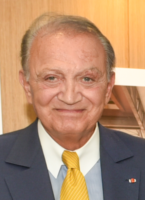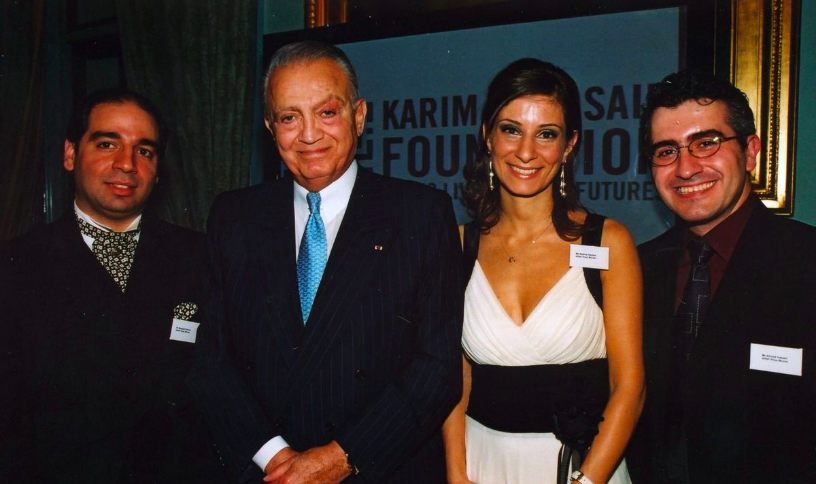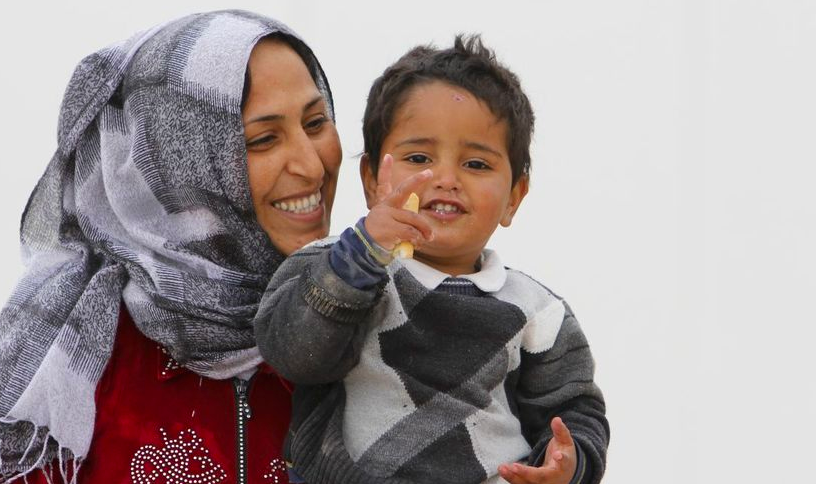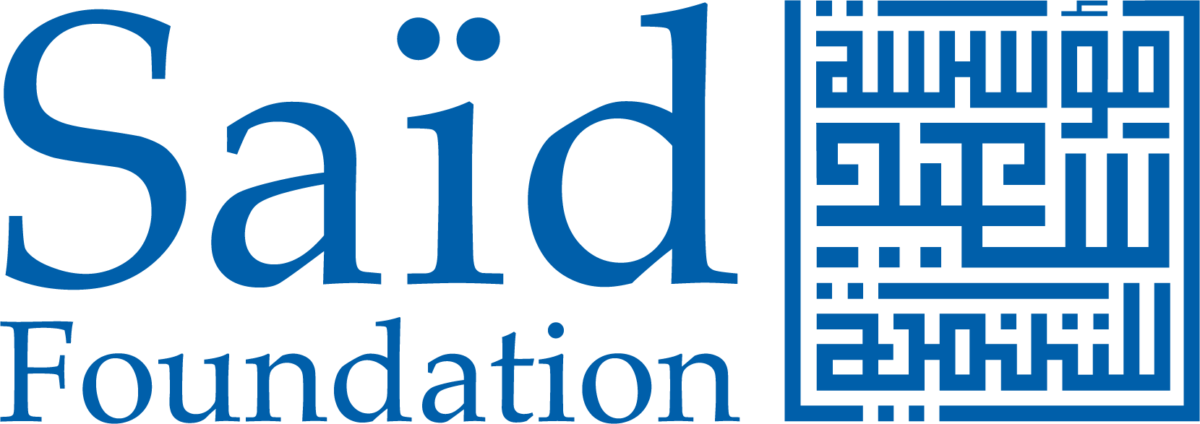This is why, through the Saïd Foundation’s Child Development Programme, I support a number of mainly grass roots organisations in the Middle East that work to bring much needed services to children from disadvantaged backgrounds, often in areas where available services are few or otherwise absent. We have focused over the years on health and education and, most importantly, on disability.
MR WAFIC Saïd
Investing in talent through
Higher Education
Higher Education
Mr Wafic Saïd co-founded the Karim Rida Saïd Foundation, now known as the Saïd Foundation, in 1982. Alongside his business career, Wafic Saïd maintains interests in many trusts and non-profit organisations.
Mr Wafic Saïd is also the Benefactor and founding trustee of the Saïd Business School Foundation, formed to build the University of Oxford’s business school and to support its pursuit of excellence. The Saïd Business School, established in 1996, is now among the leading business schools in the world.

Mr Wafic Saïd’s personal statement of philanthropy
The primary focus of my philanthropy is investing in talent through Higher Education. I am interested in its huge power to transform:
- the life opportunities of individual students; and
- through them, as its agents of change, organisations, businesses and societies;
- and through research to find ways of finding solutions to the world’s problems.
There is no issue that higher education does not touch and no cause that maximises your return on investment as a philanthropist to the same extent.
My interest in higher education is part of my family heritage. My father, Rida Saïd, founded Syria’s first university – now Damascus University – and I grew up seeing this university’s graduates acting as drivers for change in the development of Syria and other countries in the region. This is why I have tried to help Damascus University in recent times to modernise and raise its standards. I know that Syria cannot develop successfully without a large body of graduates with up to date skills, fit for and open to the wider modern world.

This is also why I support the Saïd Business School at Oxford University. Oxford is one of the world’s most influential universities. It has the highest standards and profound values of service to scholarship and, through it, to the search for understanding of the world’s problems and discovery of solutions for them. As an international businessman, I am sure that the practice of business, a force that touches everyone, can benefit from Oxford’s scholarship, teaching and values.
I’ve also been interested in supporting individual students and have done so for almost 30 years, mainly through the Saïd Foundation’s Scholarships Programme for students from certain countries of the Middle East. I’ve watched with great satisfaction as our alumni have used the skills they have acquired during their postgraduate studies in the UK to benefit so many others. An investment in a talented, highly motivated young person reaps huge returns. But I have also wanted to support students who not only had great potential but who did not have the means to study abroad. I was unable to take up a place at Cambridge because my family’s financial circumstances changed; so I know what it feels like to be denied an opportunity to fulfill your potential purely for lack of money.
Helping children
to achieve
their potential
Although higher education is the focus of my philanthropy, I have also tried to help Disadvantaged Children fulfill their potential. Higher education is what my head tells me to support – it is a strategic direction, intended to maximise the benefits that can flow from philanthropic funding. Helping disadvantaged children is what my heart tells me to do – a heart shaped by my mother who spent her life helping many charities working at the coal face of service delivery to people in need. I also never forget that the Saïd Foundation was founded in memory of my son, Karim, who had the warmest heart and great consideration for those less fortunate than himself.
I want to help children with disabilities because they are doubly disadvantaged: they have little, if any, access to the services they need; and they face a struggle in terms of how they are seen by others. I am also drawn to this field because, as a young boy, I suffered from a stammer, a small impairment in the general scheme of things but I know how it feels to be different and how it can hold you back because of the attitude of others. I was fortunate because my mother had the resources to get me the expert help that enabled me to overcome my stammer, but I have never forgotten the experience.
Geographic priorities
My interest lies in three areas. As a Syrian and an Arab, I am committed to the Middle East. This is a vast region and, while you can create ripples in ponds, drops in oceans have no effect so I focus on an area that reflects my family background- Syria, first and foremost, and also its neighbours, Jordan, Lebanon and Palestine.
The UK is another focus. My wife is English and my children have grown up in the UK. I also remember the warm welcome I was given in the UK when I needed to leave Syria.
I am aware too that my own luck and success in life have been enabled by my internationalism. I am equally at home in Europe as in the Arab world and my business has been international. So I feel that part of my philanthropy needs to be for the wider world, not for a particular region or country. The Saïd Business School, for example, is a wholly international institution that seeks to improve business practice globally.
The Foundation’s achievements
Our alumni
The students supported by the Foundation now number over 740 excluding students we support at the Saïd Business School. Practically without exception, they have done outstandingly well in their studies; they have gone on to successful careers; many have made a real difference to the lives of others in many fields. I am proud that the Foundation’s rigorous selection procedures based on merit and need have achieved this result.
Our work
in disability
in disability
The Foundation has enabled organisations to bring services to disabled children in areas where those services were lacking. In Syria in particular, where for over 15 years we have implemented our own disability programme, we have built a human resource capacity in this field that was previously lacking by delivering training over many years. This has created a cadre of local trainers who are now able to train many others.
Saïd
Business School
Business School
This young school is already one of the highest ranking schools in the world. It is now poised to become a model for how a top business school can draw on the learning of a great university in ways that benefit the practice of business globally.
Our non-sectarian
and non-political
approach
and non-political
approach
This has always been fundamental to our work. We do not ask a scholarship applicant his or her religion. It is irrelevant. We have supported mostly secular organisations but also religious ones, provided they benefit all members of the community regardless of their religion. This approach was always important; in today’s circumstances, it is more than ever necessary to demonstrate commitment to the peaceful and collaborative co-existence of all our communities.
Our professionalism
Over the years the Foundation has developed rigorous processes for selecting scholars and tracking their progress, for conducting due diligence on organisations and projects and measuring their progress and impact. By persisting with what we want to achieve and learning what works and what doesn’t, we have been able to improve what we do and increase our impact. This has enabled us to make a lasting difference to people’s lives.
Buildings
My business involved me in a great deal of construction work over the years and buildings interest me so part of my philanthropy, from time to time, has consciously sought to give institutions I care about – like Damascus University, the Saïd Business School and my old school in Lebanon – the sort of buildings that build confidence and morale in their institutions and help to create an environment of aspiration and achievement.
Our future
intentions
We have had to freeze new projects we were developing in Syria because of the tragic circumstances there. These included:
A centre for excellence in teaching and learning at Damascus University. I was about to make a ten-year commitment to creating and developing this centre. It was going to modernise curricula and raise teaching standards to help Syria’s young people obtain knowledge and skills fit for the modern world.
A not-for-profit hospital in Damascus. This was at an advanced stage of design and the site was bought. The intention was to help raise hospital standards in Syria and to provide access to a hospital for low-income patients.

As soon as it is possible to do work such as this again in Syria, I intend to reactivate these projects, the need for which will only be more urgent than it was before. In the meantime, while we wait for long-term rebuilding work to become possible, I will continue to do what I can to provide humanitarian assistance to those who are suffering from or have fled from the violence in Syria. And more broadly, I continue to look at other options in the field of international higher education, something perhaps based in the UK which has a tradition of excellence in higher education, international reach and the ability to address issues with global implications.
